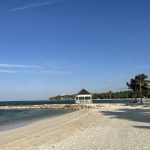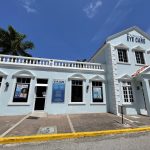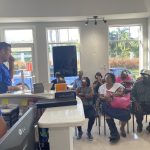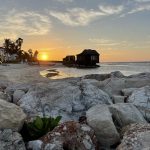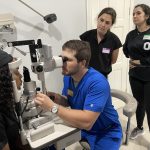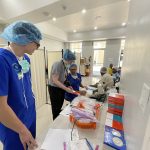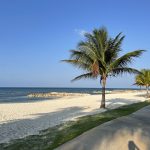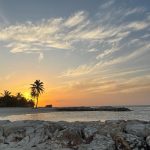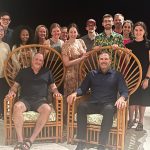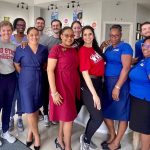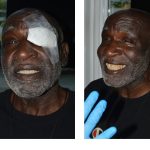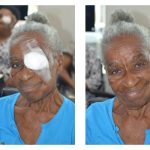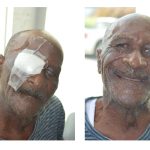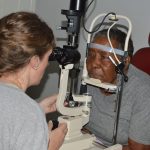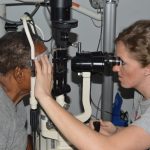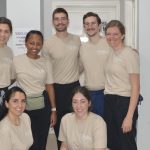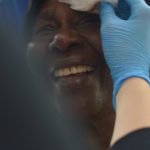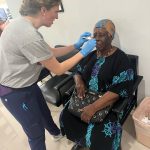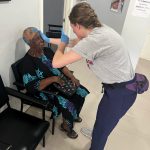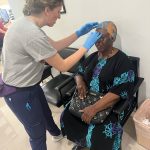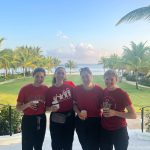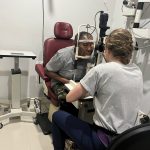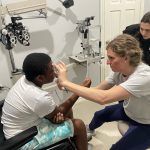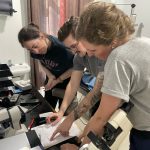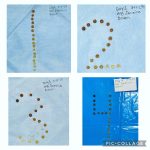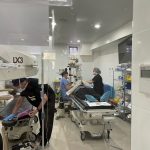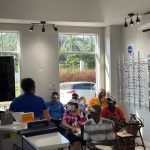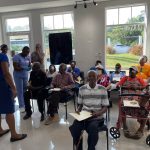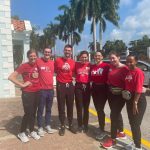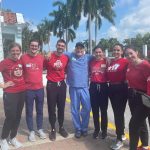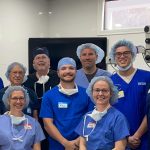Ready to be inspired? We’re thrilled to share some heartfelt moments from Dr. Van Law’s recent mission trip to Jamaica. Her dedication and expertise have made a real difference – touching lives and restoring vision. We couldn’t be more proud of her incredible impact on the world. Dr. Van Law’s commitment to providing comprehensive eye care for those in need truly reflects our dedication to global health and well-being. Here are some amazing insights from Dr. Van Law herself about her incredible journey as well as some fun pictures.
I started going on this trip when I was involved with Fellowship of Christian Optometrists as an optometry student at The Ohio State University. The FCO student group has organized a trip to Jamaica every year since 2013. I had the chance to go two of my years as a student and was in charge of planning it during my second year. A few years ago, I was asked to return as an attending doctor with OSU, and it was an easy yes! I love the chance to return to the same clinic each year and work with each new group of optometry students. I find it so encouraging to keep coming back to the same place: my first trip to Jamaica was in 2015, and the clinical care we provide on the island continues to broaden its impact each year.
We partner with Mission of Sight, a US-based non-profit, and Professional Eye Care, the local clinic in Montego Bay, Jamaica, to provide comprehensive optometric care for their patients. Mission of Sight is committed to restoring vision and reducing visual poverty in Jamaica through comprehensive eye care and surgery. On this trip, we joined a cataract surgery team with Vision Outreach International. The team from VOI completed 69 surgeries in four days, working in tandem with our FCO team seeing patients on the clinical side. In addition to comprehensive optometric exams, we saw each surgery patient for their postoperative visits, plus emergency and walk-in appointments. I came on the trip as an attending for the group of optometry students from The Ohio State University FCO. We saw mostly general ophthalmic disease, but I was available to consult on any neurologic cases.
Our trip consisted heavily of advanced cataracts. We nickname them “big browns” and “great whites” because they are so advanced; most patients are blind or have lost most of their vision as a result. These patients also require a different surgical technique called MSICS (Manual Small-Incision Cataract Surgery). There is also a high frequency of glaucoma, diabetic retinopathy, and uveitis (intraocular inflammation) on the island. We also saw some patients that had recently had pterygium surgery a few weeks prior: pterygium is a condition in which the conjunctiva (the superficial white layer of the eye) grows over the cornea and begins to block patient’s vision. This is far more common in countries which are closer to the equator and get lots of UV exposure.
There were several; it is hard to choose just one! Because several patients were blind from their cataracts, we saw several patients get their vision restored, even one day post-surgery. This is a life-changing event for these patients: it allows them to perform the simplest of every day tasks, such as seeing food to cook, recognizing faces, seeing their clothes, and living independently. There is no greater gift than restored sight!
One of our favorite patients was an 80-year-old gentleman who was blind in both eyes: he had permanent damage in his left eye from a previous cataract surgery at the government hospital in Jamaica and his right eye was nearly blind from an advanced cataract. He also had a stroke a few years prior and was wheelchair-bound as a result. He came in to have cataract surgery on his good eye during the week. On the first day after his surgery, we removed the eye patch and he was able to recognize his daughter’s face for the first time in years! His daughter started screaming because she was so surprised; and the patient started waving “good morning!” to everyone he saw in the waiting area. It was certainly impactful to see his life changed by getting his vision restored in one eye.
While the clinic has been well-established to Jamaica for several years, there are still very limited specialty services available on the island. For example, if patients need to see a retina specialist or get a corneal transplant, their only option is to travel to Kingston to be seen at the government hospital. Jamaica has a government-sponsored form of health care (for those who have it), and unfortunately many patient’s cases are still not able to be seen in Kingston, or they are placed on a long waitlist for their treatment. Even so, most patients don’t have medical insurance in the classic sense and often rely on relatives from the US or Canada to help them fund their medical and living expenses.
In my current practice, I focus solely on neuro-optometric care. In Jamaica, we see lots of primary optometric care, advanced ocular disease, and perioperative care. I also work very closely with the optometry students on the trip. It is great to be part of an incredible team with lots of different skill levels; I love teaching the students and I learn a lot by working with them too.
Most of the barriers to care come from lower socioeconomic status and less financial means. We had a patient who may need an advanced retinal procedure, but the cost of being seen in Kingston would be several thousand dollars. Even then, there was no guarantee that his condition could be appropriately addressed at that hospital. So instead, we opted for him to see a surgeon that is travelling to the clinic in Montego Bay later this year to use the in-house laser treatment the clinic has available. This is something that is encountered quite frequently; some medical decisions for longterm care have to take into account the patient’s financial means and availability of specialty services.
We had so many great resources: Mission of Sight organized our lodging, meals, and transportation on the trip. They also provide financial assistance for patients who could not otherwise afford cataract surgery. The staff at Professional Eye Care are wonderful and passionate about providing excellent eye care to all of their patients. They are the reason the clinic runs so smoothly. The team from VOI was a fantastic surgical team; they come to Jamaica about twice a year and they were great people to work with and had lots of experience, and they treat every patient with compassion and respect.
We provide a much-needed service to the Jamaican community; the gift of sight is so important, and for most of these patients the opportunity to restore their sight in one or both eyes is a life-changing event. Because the health care in Jamaica is government sponsored, the government health system cannot meet the demand of all the cataract surgeries that are needed for the whole island; the waitlist for cataract surgery is 2-4 years long, and some patients get turned away if their cataract is too advanced. Professional Eye Care provides almost one-third of the island’s cataract surgeries every year, which is of incredible value! In addition, the VOI team offers a more advanced version of cataract surgery (MSICS) which is not performed anywhere else on the island; they take more advance cases than other surgeons would. What I also find impactful is that our trip only lasted one week, but the ongoing work by Mission of Sight and Professional Eye Care ensures that these patients get high-quality eye care all year round. But I do have to add: I often feel more blessed by the Jamaican people than what I give them as a doctor; they are some of the most joyous, grateful, loving people I have had the pleasure to be around. Even with limited means, they are incredibly gracious and kind, and that is infectious.
I am reminded on these trips of how much we have to be grateful for here in the US. We have endless resources and access to privatized health care and it’s easy to take that for granted. Participating in medical missions also shows me that every human deserves to be treated with dignity, integrity, and compassion. I always come back from Jamaica refreshed by the impact that eye care can have in people’s lives. My goal in practicing neuro-optometry is to continue to have a positive impact in my patient’s lives and visual quality of life, even if it is on a smaller scale than cataract surgery.
My faith is central to the way that I practice, and I feel strongly that participating in medical missions is one of the ways I can steward my gifts well and love others. I believe in treating others with dignity and respect, regardless of their background; I hope that my practice of neuro-optometry continues to reflect those values. The gift of restored sight is one of the reasons I chose optometry as a career in the first place.
I would of course love to return to Jamaica in the coming years; I’ve been there so many times that it feels like a second home. I am also interested in partnering with other medical missions organizations in the future if the opportunity arises.


